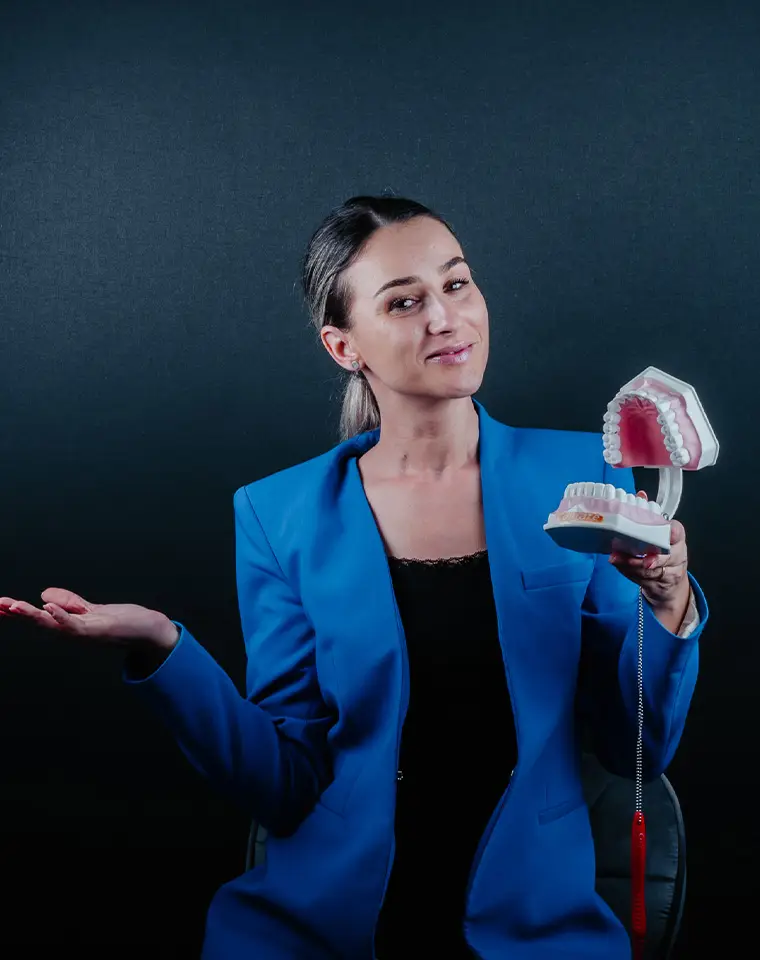
Canker Sores
Causes, Symptoms, Treatment, and Prevention
Canker sores are among the most common issues that can develop in the oral cavity. These small, painful lesions form inside the mouth and may be triggered by stress, minor oral injuries, acidic fruits and vegetables, as well as spicy and hot foods. Here’s everything you need to know about canker sores.
What Are Canker Sores?
Canker sores are shallow lesions that typically form on the soft tissues inside the mouth, such as the inner cheeks, lips, or at the base of the gums. Also known medically as aphthous ulcers or aphthous stomatitis, they appear as white or yellow spots surrounded by red tissue.
Canker sores are not contagious but are painful and can interfere with chewing and speaking. Anyone can develop canker sores, but they’re more common in teenagers and young adults, particularly among women. Canker sores are rare in children under two years old. While most people experience occasional canker sores, up to 25% of the population has recurrent episodes, often with a family history. Recurrence can be linked to genetics or environmental factors, such as certain foods or allergens.

Types of Canker Sores
Most canker sores heal on their own within two weeks. However, for unusually large or very painful sores that show no signs of healing, a dental consultation is essential.
There are three types of canker sores:
- Minor Canker Sores;
- Major Canker Sores;
- Herpetiform Canker Sores.
Minor Canker Sores
The most common type, appearing three to four times a year, often affecting individuals aged 10 to 20. They are oval-shaped with red edges, typically under a centimeter, and heal within about a week without leaving scars.
Major Canker Sores
These are less common, larger, and more painful. They are round with defined, though sometimes irregular, edges. Healing may take up to a month and often leaves scars. They are more common in people who have had previous canker sores, potentially linked to other health conditions such as a weakened immune system, Crohn's disease, or vitamin deficiencies.
Herpetiform Canker Sores
Rare and appearing as clusters of tiny ulcers with irregular edges, these typically heal within a week and don’t leave scars. Elderly individuals are more susceptible to this form.
Causes of Canker Sores
There is no definitive scientific explanation for the development of canker sores. However, several factors are known to contribute to their occurrence:

- Emotional stress;
- Minor oral injuries caused by invasive dental procedures, over-brushing, or accidental bites;
- Irritated tissues from sharp teeth or poorly maintained braces;
- Toothpaste and mouthwash containing sodium lauryl sulfate;
- Food sensitivities, especially to chocolate, coffee, strawberries, eggs, nuts, and spicy or acidic foods (lemons, oranges, apples);
- Food allergies;
- Diets low in vitamin B-12, zinc, folic acid, or iron;
- Hormonal changes during menstruation;
- Viral infections;
- Nonsteroidal anti-inflammatory drugs (NSAIDs), like ibuprofen;
- Helicobacter pylori, the bacterium responsible for peptic ulcers.
Some health conditions can also trigger canker sores:
- Celiac disease, an intestinal condition caused by gluten sensitivity;
- Inflammatory bowel diseases, such as Crohn’s disease and ulcerative colitis;
- Behçet’s disease, a rare disorder causing inflammation throughout the body, including the mouth;
- A weakened immune system, which attacks healthy cells in the mouth instead of pathogens (viruses, bacteria);
- HIV infection, which suppresses the immune system.
In some cases, the factors leading to canker sores remain unknown.
Symptoms of Canker Sores
Canker sores are often accompanied by localized pain and irritation. Typical signs to help identify them include:
- Shape: Round, well-defined, typically less than one centimeter;
- Color: White or yellow center with a red border;
- Location: Inside the mouth (inside lips or cheeks); may also appear on or under the tongue;
- Tingling sensation: Sometimes felt up to 24 hours before the sore appears;
- Occasional gum involvement and, in rare cases, the area at the back of the mouth;
- Healing time: Usually within two weeks.
In more severe cases, or if left untreated, a canker sore may result in:
- Lethargy;
- Fever;
- Fatigue;
- Swollen lymph nodes;
- Lesions extending beyond the mouth;
- Pain or discomfort when brushing, speaking, or chewing.
Prevention and Treatment of Canker Sores
Since the exact cause of canker sores is not fully understood, there’s no definitive way to prevent them. However, considering the associated risk factors, there are steps that can be taken to reduce their frequency or avoid complications.

Preventative Measures:
Mindful eating: Avoid foods that can irritate the mouth (nuts, chips, pretzels, certain spices, salty foods, and acidic fruits) or that trigger sensitivities or allergies.
Balanced diet: To prevent nutritional deficiencies, include fruits, vegetables, and whole grains in your diet.
Good oral hygiene: Brush teeth regularly after meals using a soft toothbrush (to avoid irritating delicate tissues), avoid toothpaste and mouthwash containing sodium lauryl sulfate, and use dental floss once a day to maintain oral health.
Stress management: For canker sores triggered by stress, relaxation techniques like meditation can help lower stress levels.
Most common canker sores heal within two weeks without medical treatment. However, more severe or recurrent cases may require treatment in a dental clinic. This includes lesions that:
- Are large in size;
- Spread quickly;
- Reappear immediately after healing;
- Are slow to heal, even when risk factors (foods, medications, stress) have been removed;
- Make it difficult to consume liquids;
- Cause a fever.
A dentist will determine the diagnosis based on a clinical examination or medical history. Generally, canker sores should be evaluated by a specialist if they do not heal after two weeks, worsen despite home remedies, recur more than three or four times a year, are numerous or severe, or occur alongside other symptoms (fever, headaches, skin irritations, diarrhea), or as part of another health condition.
Treatment for Canker Sores can be either medical or natural.
Medical Treatment
Pain from common canker sores usually subsides a few days after they appear. In cases of complex sores that do not heal quickly or recur frequently, a dentist may offer various solutions:
- Mouthwash with steroids or analgesics;
- Topical medications containing steroids, like dexamethasone for inflammation, and analgesics, like lidocaine, for pain relief;
- Oral medications, including hydrocortisone lozenges;
- Nutritional supplements if deficiencies are causing canker sores;
- Cauterization to disinfect and treat the lesions.
Natural Remedies
Several home remedies can help speed up the healing of canker sores and reduce discomfort and pain.
- Applying small amounts of ice, milk, or honey on the sores can relieve pain and aid in healing.
- Rinsing the mouth with a mixture of warm water and baking soda may also alleviate pain.
In conclusion, while canker sores are not contagious, they can be extremely painful in severe cases. Though they often heal on their own, it is advisable to consult a dentist, especially if they are recurrent or appear alongside other symptoms. Although the causes of these lesions are not scientifically proven, certain risk factors play a significant role in their development.
References:
- https://www.medicalnewstoday.com/articles/303311#Treatment
- https://www.healthline.com/health/canker-sores#home-relief
- https://www.webmd.com/oral-health/guide/canker-sores
- https://my.clevelandclinic.org/health/diseases/10945-canker-sores
- https://www.mayoclinic.org/diseases-conditions/canker-sore/symptoms-causes/syc-20370615
- https://www.ncbi.nlm.nih.gov/pmc/articles/PMC4002348/


